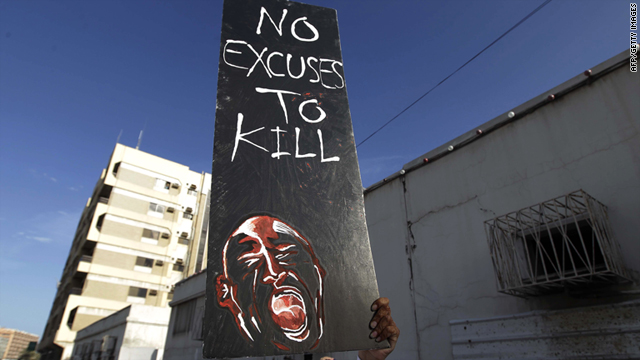By Adom M. Cooper
Impunity Watch Reporter, Middle East
MANAMA, Bahrain–A special military court has begun trial of some 48 medical professionals, accused by the local government of supporting weeks of pro-democracy protests throughout the country. The Court of National Safety held its initial sessions in politically motivated cases against opposition members of parliament and a well-known defense lawyer. The proceedings took at Salmaniya Medical Complex, without notifying the lawyers or the families of those on trial.

Most of the convictions against the individuals on trial were charges such as “participating in unauthorized demonstrations and incitement of hatred against the regime.” These charges yielded prison sentences from one to five years. One of the lawyers for the doctors said they had been tortured, forced to confess, and denied access to counsel during the initial hearings. Bahraini officials denied any allegations of systematic torture and asserted that any incidents of abuse would be properly investigated and prosecuted.
Human Rights Watch reports that it is aware of at least 82 individuals for whom verdicts had been delivered in the Court of National Safety as of June 13, while several dozen more cases are pending. Out of the 82 cases, 77 were convicted on some charges and only five were completely acquitted. There is evidence that most of the charges are originating from hospital staff choosing to treat hundreds of wounded protesters. Bahraini officials have accused the doctors from stealing medicines from the hospitals and stockpiling arms to support the protesters.
Many international human rights groups have expressed serious concern with hauling civilians in front of a military court, especially when wounded civilians are the catalyst of the investigation. David Michalski, of Medecins Sans Frontiers, shared these sentiments with an Al-Jazeera correspondent:
“The net effect of this, including the detention of the doctors and the medical personnel, the net effect for the patient is some patients are very fearful, and they don’t know where to go when sick and injured, [or] if they are injured in these protests. Medical personnel should be allowed to deliver treatment in an impartial manner.”
The preliminary sessions of the Court of National Safety against these individuals came just days after the Crown Prince, Shaikh Salman bin Hamad Al Khalifa, met with US President Barack Obama in Washington, DC, to garner support for a “national dialogue” with opposition forces.
Bahrain is host to the U.S. Navy’s Fifth Fleet and has called on its fellow Sunni-led Gulf neighbor Saudi Arabia to help disrupt the pro-democracy protests that began in March. The ruling royal family consists of Sunni Muslims while the majority of the nation is made up of Shiite Muslims. Its leaders have placed the onus for the protests on sectarianism and Iran’s involvement.
For more information, please see:
CNN-Rights group urges Bahrain to stop military tribunals-14 June 2011
Human Rights Watch-Bahrain: Stop Military Court of Travesty Justice-14 June 2011
Al-Jazeera-Bahrain medics on trial over protests-13 June 2011
The Guardian-Bahrain doctors deny stealing medicines or stockpiling arms-13 June 2011
New York Times-Bahrain-Doctors Seized in Crackdown Say They Were Tortured in Custody-13 June 2011


